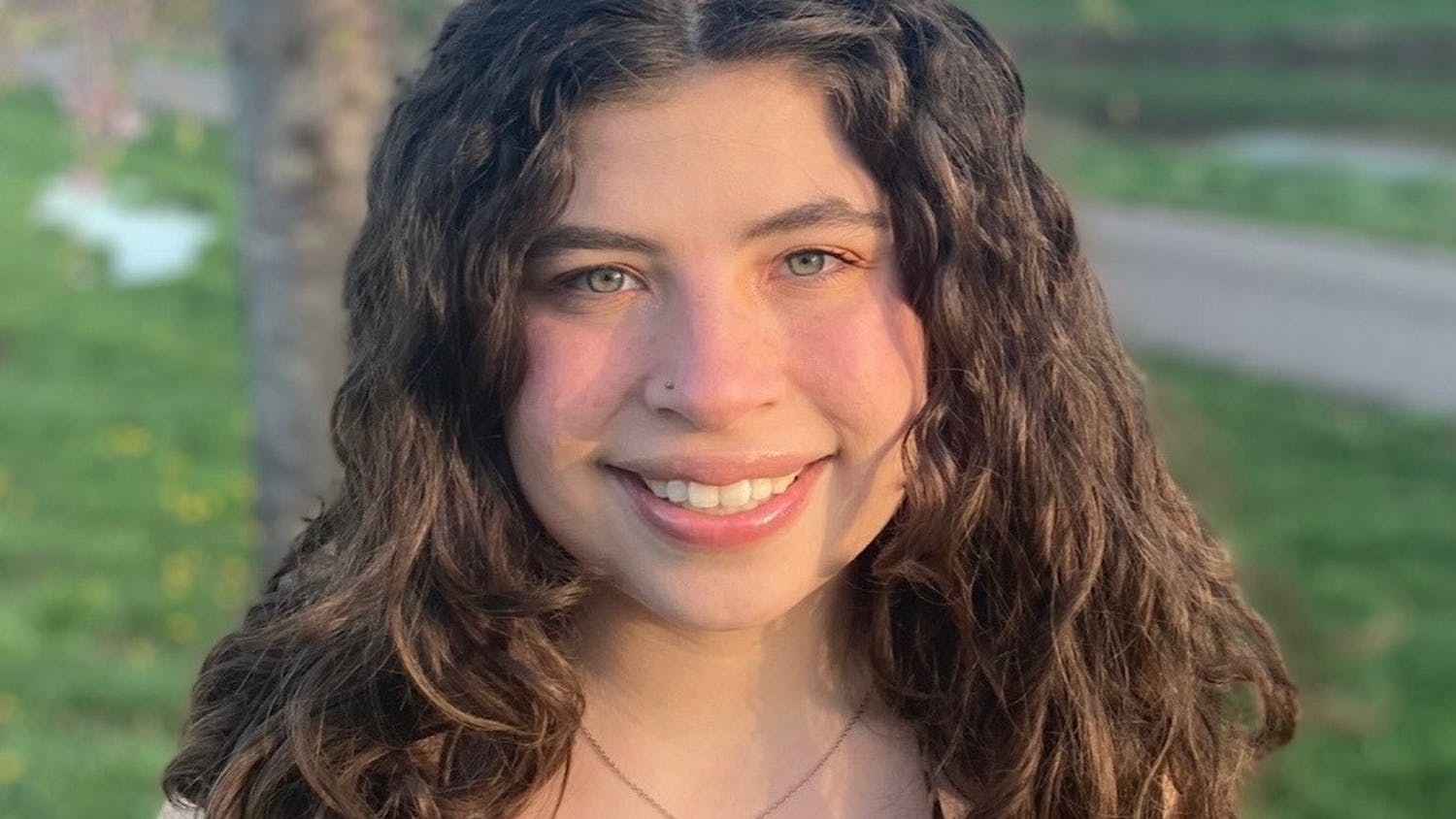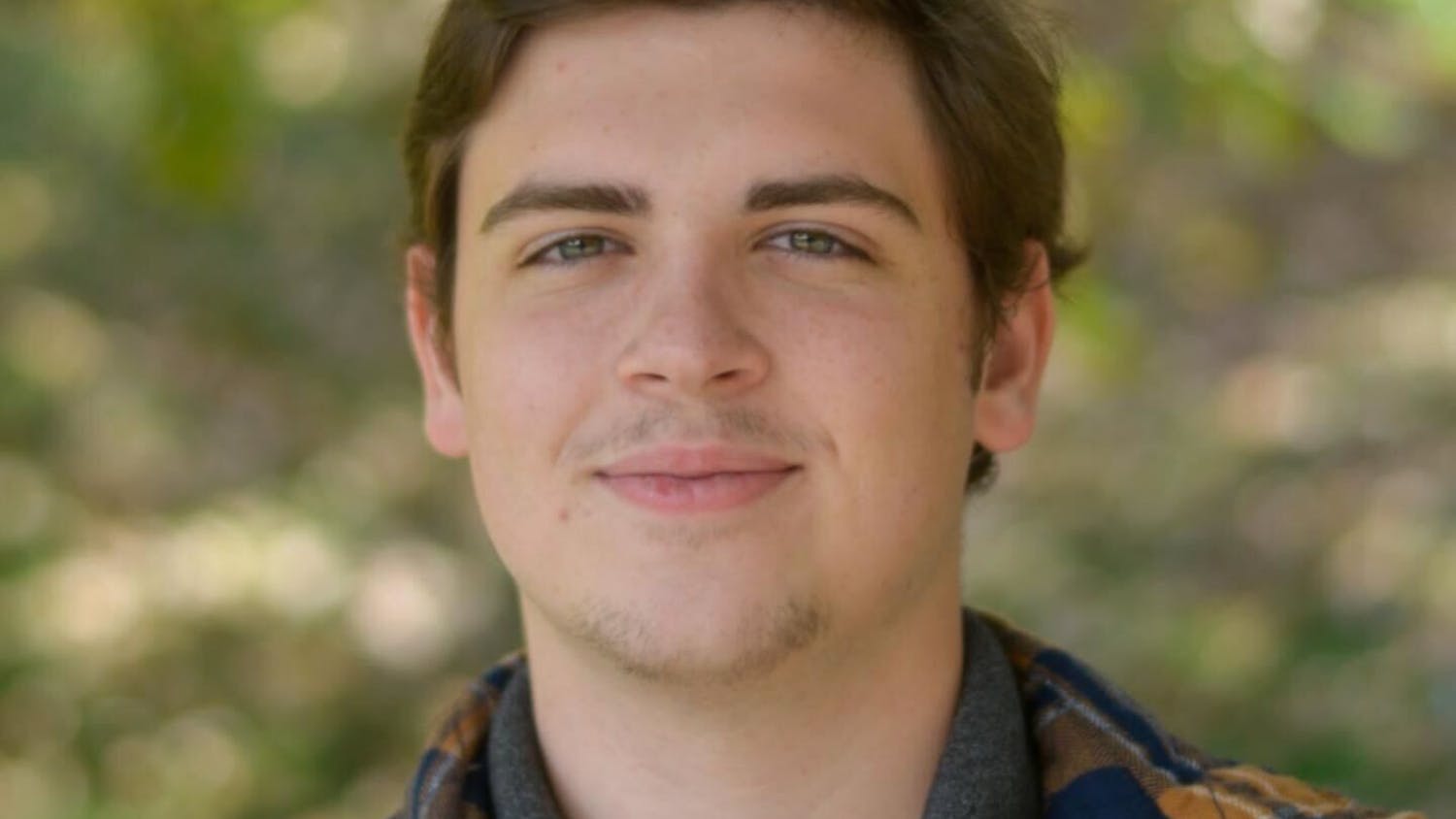A welcomer pointed in the direction of Baker University Center rooms 202 and 204 and mentioned a person who could be approached wearing glasses with red chunky rims. In actuality, they were sporting glasses with white chunky rims.
The minor mistake in detail about Sarah Livingston seemed to get lost in her infectious personality. Livingston, the executive director of Hillel and a classics instructor at Ohio University, led a group of 40 people, a turnout that surprised her, in a conversation about antisemitism on Tuesday.
“The agreement that we will make together today is that this is a totally safe space to talk about the things that you thought might not be comfortable to talk about in polite company,” Livingston said to the group.
Writing on a whiteboard, Livingston first asked people what stereotypes they have heard, throughout their lives, about Jewish people. Livingston reminded the group that antisemitism – prejudice and intolerance toward Jewish people – comes in many forms.
The list began with a phrase originally said by Majorie Taylor Greene, the U.S. Representative from Georgia’s 14th district. Green, an extremist right-wing politician known for being antisemitic, blamed the 2018 California wildfires on “Jewish space lasers.”
People in the group also thought more about casual antisemitism and microaggressions they see in media and in day-to-day life. Some people mentioned harmful associations such as banks, greed, Hollywood and more.
Livingston then guided everyone to the term “systemic bias” and asked the group a leading question.
“Has anybody ever had someone schedule a really important class assignment due on Christmas?” she asked. “A field trip you’re required to go to for attendance points on Easter? No – why would somebody do that?”
There have been many students who, Livingston said, have had problems with professors who refused to accommodate them for missing class on Yom Kippur, the holiest day in the Jewish calendar.
“The entire calendar is rooted on Christian holidays, and the concept of Christian America, which we’ve all lived with and adapted to,” Livingston said. “But when people are penalized for the alternative, not being Christian, in any capacity that is, first of all, in this instance, systemic. It’s a systemic bias.”
A video was then played for the group about the history of antisemitism. Its existence and persistence runs deep and long. For millennia, antisemitism has been prevalent around the world.
When people were organized into groups for a conversation of reflection about the video, people were surprised by how early Christians treated Jewish people. A myth that people who attended or attend Christian churches may have heard is what’s known as “deicide,” according to the Anti-Defamation League, or ADL.
Deicide is the myth centered around the anti-Semitic belief that Jewish people killed Jesus Christ. Historians and Christian leaders have found that deicide is a baseless claim, according to the ADL. But people still misinterpret biblical readers, which “has been used to justify violence against Jews for centuries.”
This is only one part of the whole historical story of antisemitism. The term antisemitism was not used until Wilhelm Marr fathered the term in 1879, according to the Jewish Virtual Library.
When the conversation shifted to what antisemitism looks like today, Livingston shared some statistics from the ADL and the FBI’s annual report on hate crimes from 2022.
“The Jewish population of the United States equals 2% of the total population,” Livingston said. “It’s a really small minority.”
She also said religious hate crimes are measured differently from hate crimes that target people based on other reasons and identities.
“Just religious hate crimes in the U.S., targeting Jews equals 60% of all religious hate crimes,” Livingston said.
And 13% of all hate crimes, whether targeting people based on race, sexuality or for other marginalized identities, Livingston said, target Jewish people.
Kanye West, although not the only celebrity, has been posting antisemitic messages to his millions of followers. One of West’s antisemitic Tweets, which was widely reported on, said West would act violently against Jewish people. The ADL said that the Tweet has since been deleted but his “dangerous rhetoric may help advance the spread of existing false and antisemitic narratives shared by extremist groups.”
Livingston showed an example of the immediate effects following West’s Tweet. Over a major highway in Las Angeles, a day after West’s Tweet, men holding a large sign that read “Kanye is right about the Jews” while doing the Nazi salute were photographed.
“You’ve got to stand up, you’ve got to say something,” Livingston said. “Also, the other thing too is, Jews see silence just as much as they see loud voices. So if you want to stand up for Jews, when antisemitism happens, call it out.”
Hannah Karr, a junior studying journalism and marketing and the marketing and communications intern at Hillel, helped with the event and conversation. She said the opportunity to talk about antisemitism was important.
“I think that antisemitism is a big topic within our organization, within our individual lives and it’s very prevalent to all of us even if we don’t directly experience it all the time,” Karr said.
Similarly, Leah Leonard, a sophomore studying communications and the Shabbat and holiday intern at Hillel, said the event helped reflect how normalized antisemitism is.
“And now that celebrities are doing it so now more people are noticing it, which is interesting,” Leonard said. “So I feel like once people saw that Tweet, it’s just important to talk about because I feel like it hasn’t been talked about in this way.”
People who have witnessed or see antisemitism on campus or elsewhere can report the incident to the ADL Cleveland, Livingston said. Reports can be anonymous and Livingston will be notified about reports on OU’s campus.
It is important for students to recognize antisemitism and educate themselves about what acts of antisemitism look like. Livingston encourages people to call it out when they see it and to take away the power from anti-Semitic people.
“We’re not giving (West) any bandwidth, suck the air out of his room, let’s be done with this,” Livingston said. “And like admitting like, hey, what happened was wrong. Your Jewish friends are going to see that and they’re going to be like, this person is on my side.”






